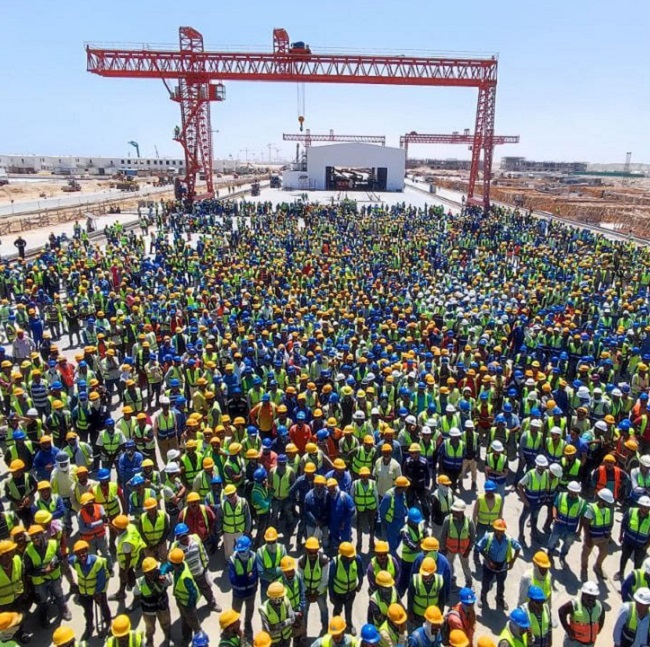
On Tuesday, July 18, 2023, in the course of the joint visit of a high-level delegation to El-Dabaa NPP, Alexey Likhachev, Director General of ROSATOM, met with Dr. Mohamed Shaker, Minister of Electricity and Renewable Energy Sources and Dr. Amged El-Wakeel, Chairman of the Nuclear Power Plants Authority of Egypt.
The delegation made a tour around the NPP construction site to check the status of the works that are under way, visited the sea port built for the future NPP, listened to reports about the progress of the construction works at Units No 1, 2 and 3 and the preparatory works at Unit 4 in view of the future pouring of “first concrete”.

“Construction of the first three Units of El-Dabaa NPP is going in full compliance with the schedule. Preliminary works are under way on the site of Unit 4. By the end of this year, we expect to obtain the construction license for Unit 4 from the supervisory authority of Egypt – the Egyptian Nuclear and Radiological Regulatory Authority. After this, we will be able to carry out the first concrete pouring, which will mean the beginning of the main stage of Unit 4 construction”, said Alexey Likhachev, Director General of ROSATOM.
During the visit, the Minister of Electricity of Egypt and Director General of ROSATOM also participated in the official ceremony of opening of the administrative building of the Nuclear Power Plants Authority (NPPA) established at the NPP site.
During the visit, Dr. Shaker expressed a high opinion of the level of relations between the Arab Republic of Egypt and the Russian Federation, explaining that the history of bilateral relations dates back to the 50s of the last century, when the Soviet Union assisted Egypt in the construction of the Aswan Dam, the metallurgical complex in Hilwan and the aluminum smelter in Nag Hammadi. Besides, it was the Soviet Union that supplied Egypt with the country’s first research reactor launched in 1961. The relations between the two countries reached its fullest development and blossoming with the current Egyptian President Abdel Fattah Al-Sisi. It was during this period that Russia was chosen by Egypt as a strategic partner for the implementation of the project of construction of the first NPP in the country.
Dr. Amged confirmed that the Nuclear Power Plants Authority (NPPA) is committed and making every possible effort to implement the dream of all the Egyptians – the start-up of the first NPP in Egypt – El Dabaa NPP, in compliance with all the nuclear safety criteria and successful achievement of the milestones of the project’s time schedule. Among such achievements this year we can mention the arrival of the first long lead equipment – the core catcher – at the specialized port of El Dabaa and its delivery to the NPP construction site on March 20. On May 3, the “first concrete” was poured at Unit 3. A year earlier, “first concrete” was poured at Units 1 and 2.
For reference:
El-Dabaa NPP is the first nuclear power plant in Egypt which will be built in the city of El-Dabaa, Matrouh province, on the Mediterranean coast, approximately 300 km North-West of Cairo. The NPP will consist of four power units, 1200 MW each, with VVER-1200 reactors (pressurized water reactor) of generation III+ . This is the newest generation technology which has references and is already operating successfully. There are four operational power units of this generation: two reactors at Novovoronezh NPP and two at Leningrad NPP. Outside Russia, two similar units are generating power at Belarus NPP. The NPP is being constructed in accordance with the package of contracts which entered into force on December 11, 2017. In accordance with the contractual obligations, the Russian party will not only construct the power plant but will also supply nuclear fuel for the whole life cycle of the NPP and will provide assistance to the Egyptian partners in training of the personnel and support of operation and service of the plant during the first 10 years of its operation. Under a separate agreement, the Russian party will build a special storage and will supply containers for storing spent nuclear fuel.
Russia is consistently developing international trade and economic relations, focusing on cooperation with friendly countries. Despite external restrictions, the domestic economy is augmenting its export potential to supply goods, services and raw materials all over the world. The implementation of major international energy projects is underway. Rosatom and its enterprises are taking an active part in this work.